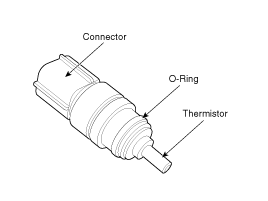Kia Optima Hybrid: Engine Control System / Engine Coolant Temperature Sensor (ECTS) Description and Operation
| Description |

 Intake Air Temperature Sensor (IATS) Repair procedures
Intake Air Temperature Sensor (IATS) Repair procedures
Inspection 1. Turn the ignition switch OFF. 2. Disconnect the IATS connector. 3. Measure resistance between the IATS terminals 3 and 4. 4. Check that the resistance is within the specification. Temperature ...
 Engine Coolant Temperature Sensor (ECTS) Specifications
Engine Coolant Temperature Sensor (ECTS) Specifications
Specification TemperatureResistance (k?)°C°F-40-4048.14-20-414.13 ~ 16.830325.7920682.31 ~ 2.59401041.15601400.59801760.32 ...
Other information:
Kia Optima Hybrid (TF HEV) 2016-2020 Service Manual: Specifications
Specification Smart Key Unit ItemsSpecificationRated voltageDC 12VOperating voltageDC 9 ~ 16VOperating temperature-30°C ~ 75°C (-22°F ~ 167°F)LoadMax. 2.9mA (When welcome light off)(When welcome light function ON, increase 2mA - 60days average) RF Receiver ItemsSpecificationFrequency315 MHzAntenna ...
Kia Optima Hybrid (TF HEV) 2016-2020 Service Manual: Electric Parking Brake (EPB) Description and Operation
Description Description of EPB The EPB is an electronic parking brake. The EPB is different from existing parking systems which operated with the brake pedal or the lever type. The EPB system sends the signal to the ECU when a driver operates the EPB switch. The ECU operates the EPB actuator composed ...
